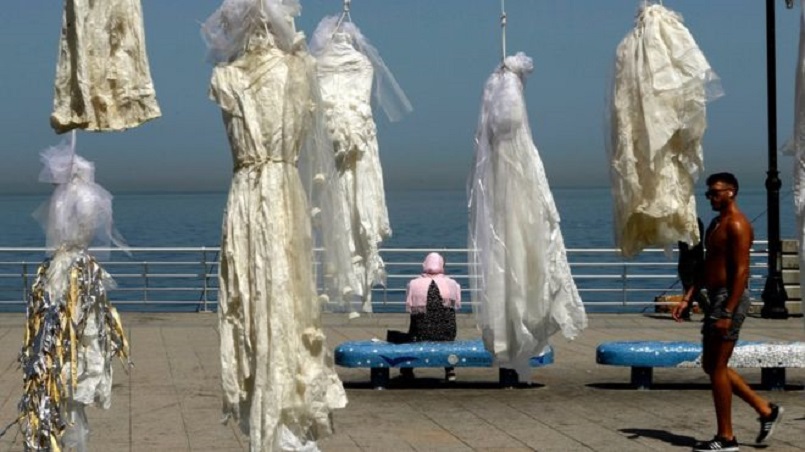
Activists campaigning to change Lebanon's law on rape have staged a macabre protest on Beirut's famous sea front.
What appeared to be more than 30 white wedding dresses were hung from nooses, strung up between the palm trees.
Lebanese law currently allows a rapist to be exonerated if he marries his victim.
The activists are pressing to have the legislation abolished at an upcoming session of parliament.
Minister for Women's Affairs Jean Oghassabian described the article as being "from the stone age".
"There are 31 days in a month and every single day, a woman may be raped and forced to marry her rapist," said Alia Awada from the non-governmental organisation Abaad.
A proposal to scrap Article 522 of the penal code, which deals with rape, assault, kidnapping and forced marriage, was introduced last year and approved by a parliamentary committee in February.
Activists hope that MPs will vote to abolish it when it goes to a vote on 15 May.
BBC World Service Middle East editor Alan Johnston says the ghostly wedding dresses swaying in the wind beneath their nooses conjure a sense of a brutal snuffing out of life and hope.
That is the sort of impact the controversial law may have on victims of rape, our correspondent says.
The installation was designed in Paris by Lebanese artist Mireille Honein.
She told AFP news agency that Article 522 had left women "without an identity" and was "shameful for those imposing it on them".
Last December, women dressed in wedding dresses made from bandages to protest against the law.
Art for protest's sake
Mireille Honein's hanging wedding dresses are the latest in a line of protests using artistic expression to highlight violence against women
Domestic violence: A group of "guerilla feminists" in China marched up a Beijing street wearing wedding dresses spattered with red paint to highlight the issue, little debated in the country, but were later detained for more than a month in 2015 on public disorder charges, sparking an international outcry
So-called "honour" crime: Eighteen-year-old Tunisian feminist Amina Sboui wrote "my body belongs to me. It is not the source of anyone's honour" on her chest and published the topless photograph on the internet in March 2013. She subsequently had to go into hiding and spent two years in France before returning.
Female genital mutilation (FGM): UK playwright Charlene Jones won an award for her play looking at the impact of FGM - some form of which has been carried out on 200m women around the world, the UN says - as seen through the eyes of two 15-year-old girls.
